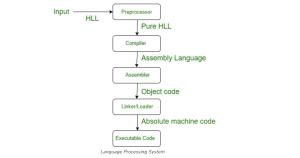Entrance Announcement
MICTE 2080
2080 Magh 07
User:Ram baduwal lesson plan 10
Jump to navigation
Jump to search
Subject: Computer science
Topic: Language processers
Time: 10 minutes
Number of student: 15
Class: VI
Period: 5th
Specific Objectives:
- To introduce students to the concept of language processors and their role in computer systems.
Teaching Aids:
- Whiteboard and markers
- Diagrams or images
Classroom Activities:(7min)
- Start by asking students if they have ever wondered how computers understand and process the languages we use.
- Write the term "Language Processors" on the board and ask if anyone has heard of it before.
- Explain that language processors are a crucial part of a computer system that helps it understand and execute human-readable instructions or programs.
- Mention that language processors include compilers and interpreters, which convert high-level programming languages into machine code that the computer can understand.

Types of Language Processors
- Briefly describe the two main types of language processors: compilers and interpreters.
- Explain that compilers translate the entire program into machine code before execution, while interpreters translate and execute one line at a time.
Examples and Everyday Use
- Provide simple examples of high-level programming languages like Python, Java, or Scratch.
- Discuss how these languages are used in creating applications, games, and other software that we encounter in our daily lives.
Conclusion:(1min)
- Summarize the key points discussed during the lesson.
- Encourage students to think about how language processors play a role in the technology they use, such as apps on their smartphones or websites they visit.
Evaluation:(2min)
- What is the main purpose of a language processor in a computer system?
- Can you name two types of language processors, and briefly explain how they differ?